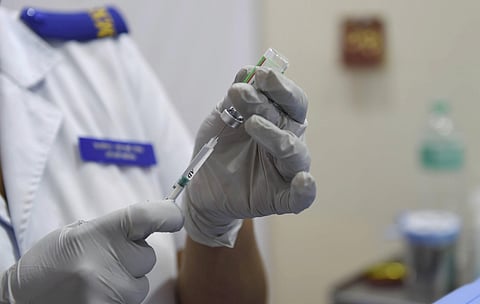

CHENNAI: A survey analysing the perception of people towards Covid-19 vaccines in Tamil Nadu showed that 80.3 percent of male participants and 81.6 percent of female participants were ready to get vaccinated.
The study was carried out in July by the Directorate of Public Health with the assistance of the postgraduate students (Community Medicine) from the Madras Medical College and the Greater Chennai Corporation (GCC) in 95 clusters across the State.
The Health Department conducted the study as part of its efforts to dispel misconceptions about Covid vaccines.
Of 1,802 unvaccinated participants, 1,079 said they didn't take the vaccines as they did not know where to get them while a whopping 57.6 percent said they didn't take the vaccine due to fears of complications and 48.4 per cent said they were afraid of the injection.
Also, 22.5 percent did not get vaccinated due to long queues and waiting time while 21 percent cited having none for company as the reason.
Meanwhile, 13.3 percent didn't take it as the vaccination centres were far from their workplaces while 9.5 percent cited lack of availability of their choice of vaccines as the reason, the survey found. Of the 1,048 vaccinated participants, only 246 people had taken both the doses.
The team chose the 95 clusters randomly, with each cluster comprising 30 random houses. Vaccine hesitancy was observed in 19.7 per cent and 18.4 per cent of men and women respectively, the study report released to the media by the Health Department found.
Also 82.5 percent of those residing in urban areas and 79.7 percent of the rural area were willing to get vaccinated.
Vaccines hesitancy was present among 17.5 per cent and 20.3 per cent of urban and rural residents respectively. Vaccine acceptance among 18-44 years, 45-60 years, and above 60 years was found to be 83.1 percent, 81.8 percent and 72,4 respectively.
Vaccine hesitancy among those above 60 years of age was 27.6 percent while it was 16.9 percent among those in the 18-44 age group and 18.2 percent in the 45-60 years. Difficulty to register on the CoWIN app was cited as the reason for not getting vaccinated by 22.5 percent of people. Of the vaccinated, 36.1 percent, also said it was difficult to register.
Since the vaccine hesitancy is highest among the 60-plus age group, Dr T S Selvavinagayam, Director of Public Health, said that awareness programmes on vaccines will be conducted.
"We will spread awareness among the 60-plus age group to come forward and get vaccinated. Information, education and communication activities will be conducted. We will also conduct more camps near home for them," Dr Selvavinayagam added.
The health department said that strategies and facilities would be created to counter the barriers and empower everyone to get vaccinated with confidence.
Even as acceptance of the vaccine is high, senior officials in the health department said that they could finally meet the demand as the Centre had stabilised vaccine supply to the State.
Speaking to The New Indian Express, Health Secretary J Radhakrishnan said, "From the month of June, the supply of vaccines is stable. In fact, the Centre is supplying additional doses seeing our consumption. Only Covaxin is not sufficient."
Dr Selvavinayagam said that the Union government had supplied 12 lakh more doses than the committed supply based on the State's performance. “They might provide even more seeing our performance in the coming months. We also help private hospitals to get their supply from the Centre," he added.